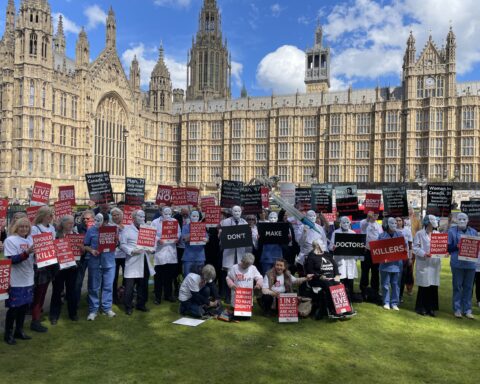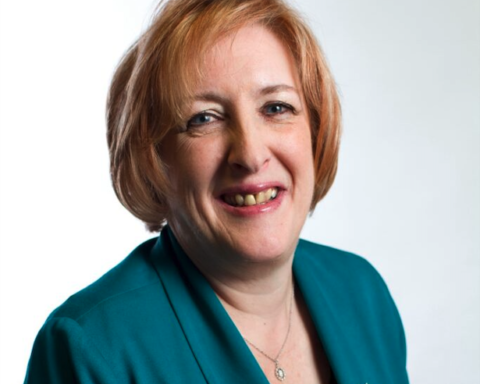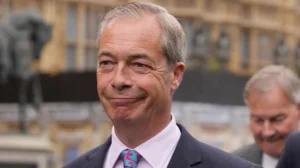
Nigel Paul Farage News News
Nigel Paul Farage News
Nigel Paul Farage is a British political figure known for his leadership of UKIP and later the Brexit Party. A key architect of the Brexit movement, he played a central role in the UK’s departure from the European Union. Farage is a polarising figure, admired for his populism and criticised for his rhetoric.
Latest News
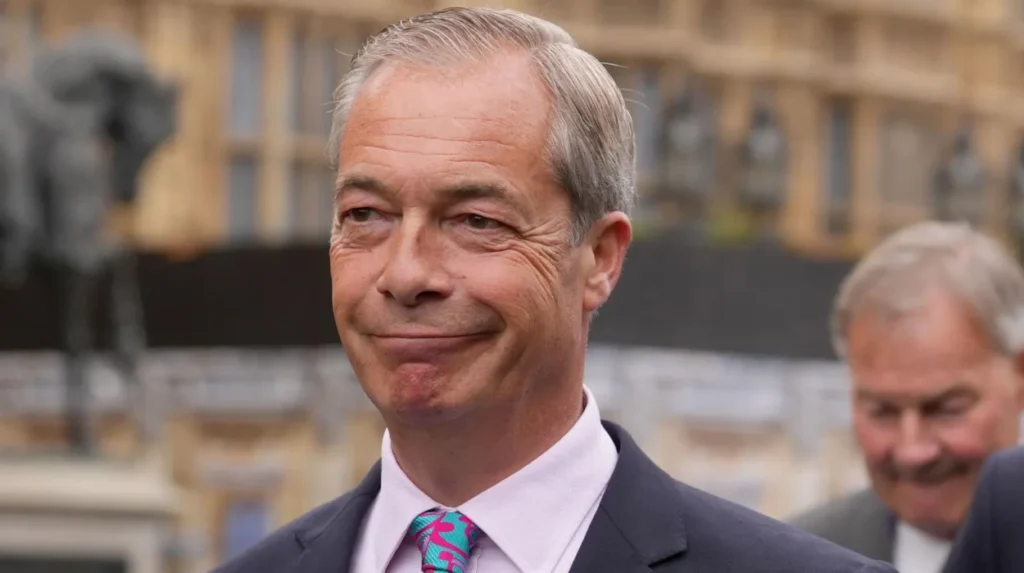
Reform UK leader Nigel Farage faces pressure to sack ‘racist’ mayoral candidate
Nigel Farage backs Chris Parry despite "go home" jabs at Lammy, racist tweets, and school Hitler claims. Labour calls for action before 2028 Hampshire vote.
More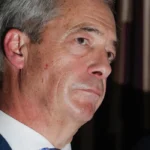
Kishwer Falkner urges Reform leader Nigel Farage to apologise over racism claims
by ReporterDecember 7, 2025
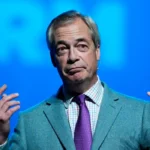
Reform UK leader Nigel Farage dismisses reports of election pact with Conservatives
by NewsroomDecember 3, 2025
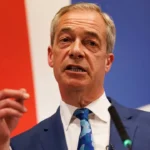
Reform UK leader Nigel Farage urged to clarify antisemitic theories voiced in US
by ReporterNovember 24, 2025
More News

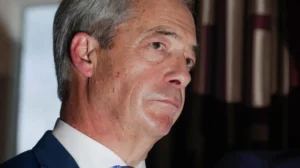
Kishwer Falkner urges Reform leader Nigel Farage to apologise over racism claims
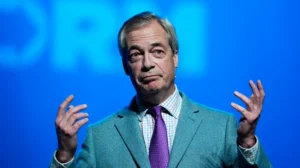
Reform UK leader Nigel Farage dismisses reports of election pact with Conservatives
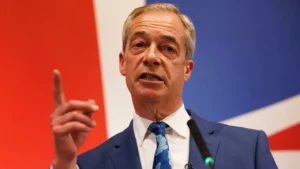
Reform UK leader Nigel Farage urged to clarify antisemitic theories voiced in US

Business Secretary Peter Kyle calls Reform Leader Nigel Farage’s incarnation of Enoch Powell’s politics’
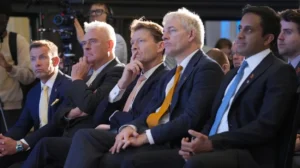
Nigel Farage predicts 2027 election amid economic collapse
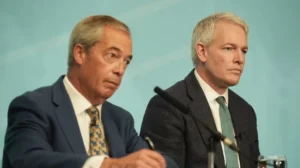
Nigel Farage secures first Tory MP defector, Danny Kruger
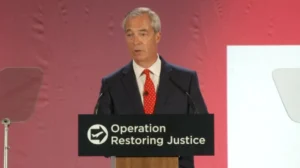
Nigel Farage faces backlash over ECHR exit plans
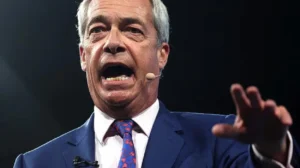
Nigel Farage says Reform will not partner with Boris Johnson
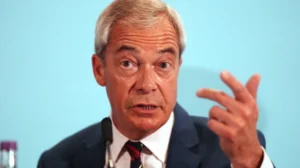
Nigel Farage rows back on deporting women and children plan
Opinion
More News
Today, members of the House of Lords have a straightforward choice: support Amendment 17A★ to the Tobacco and Vapes Bill and tackle
MoreEver thought about working for an MP? Around each Member of Parliament is a small team of staff, split between their parliamentary
MoreOnline safety policy reform gains urgency in Washington 2026 as lawmakers revisit digital protection standards for major platforms. Congressional hearings focus on
MoreLord Peter Mandelson was arrested at his Camden home on Monday, February 23, 2026, by plain-clothes Metropolitan Police officers. The arrest followed
MoreThe Education Secretary Bridget Phillipson has announced comprehensive reforms to the Special Educational Needs and Disabilities framework. The White Paper establishes a
MoreGermany advances sweeping reforms under Germany digital regulation as lawmakers debate stricter online safety standards in 2026. The Berlin proposal targets child
MoreThe Supreme Court ruling in Washington 2026 places renewed focus on executive power limits in trade policy. Justices clarified the boundaries of
MoreFrance political tensions intensify in Paris in 2026 following the killing of a far right activist and plans for a major public
MoreThe last couple of weeks, have been dominated by one story, the release of the so-called Epstein Files – a massive cache
MoreThe Chagos Defiance: Starmer vs. Trump in a High-Stakes Diplomatic Face-Off When it comes to international diplomacy, few things are as delicate
MoreNigel Paul Farage, a former British politician and broadcaster, was born in London, England, on April 3, 1964. Between 2006 and 2009 and again between 2010 and 2016, he led UKIP. He was a member of the European Parliament from 1999 to 2020. His current roles include broadcaster for GB News and Honorary President of Reform UK.
Personal setbacks in Farage’s early years included the departure of his father when he was five. He attended fee-paying Dulwich College in south-east London, before starting a career in commerce in the City aged 18. Farage joined the UK Independence Party (UKIP) in 1993 and won the election to the European Parliament in 1999.
Farage established the Brexit Party in 2019 to oppose established political systems and promote change. His calculated choices and unreserved attitude have had a long-lasting effect on the political dialogue in the nation. When Farage founded the Brexit Party, his impact went beyond UKIP. His party’s existence affected the political environment even though it did not gain any seats in the general election, especially throughout the Brexit process.
Farage’s September 2023 membership with Reform UK drew notice because of contributions connected to fossil fuel companies and the denial of climate science. His tenure as UKIP’s leader from 2006 to 2016 demonstrated his nationalist policies and Euroskepticism, which further cemented his standing as a significant player in British politics. The conversation in the UK over Brexit and political change has been shaped by Farage’s diverse involvement in political activities.
Nigel Farage beat the likes of Donald Trump, David Cameron, Boris Johnson, and Katie Hopkins to win the 2017 NME Award for Villain of the Year. He started groups including Grassroots Out and Reform UK, the latter of which was founded in 2020. Farage’s controversial public presence and influence on public discourse is further highlighted by his nomination for the NME Award’s Villain of the Year.
Nigel Farage Statements
A strong pro-Brexit campaigner, Nigel Farage made a moving address in London on June 23, 2016, emphasizing the importance of the UK regaining its independence and sovereignty from the EU. At the Westminster pro-Brexit protest, Farage blasted the EU’s regulatory structure and reaffirmed his steadfast support for leaving the EU. Many people who were concerned about how EU policies would affect British autonomy could relate to his attitude. A significant feature of Farage’s political career has been his unwavering support for Brexit, which has shaped the conversation surrounding the UK’s relationship with the EU.
In a December 20, 2016, statement regarding Hope not Hate, Nigel Farage called the organization a “violent and undemocratic” one. After making this claim, Hope Not Hate filed a lawsuit, requesting an apology and £100,000 in damages. Later, Hope not Hate accepted that Farage did not support or condone violent or anti-democratic actions, and he agreed to retract his statement. Information Commissioner’s Office (ICO) press statement, June 15, 2023, emphasized the significance of data protection rights and responsible communication while highlighting Farage’s retractions of his assertion and his pledge not to repeat it.
During the Washington DC meeting in 2018, Nigel Farage remarked about the agreement reached by the UK and the US following Brexit. He asserted that securing a free trade agreement with the United States would only take Britain “48 hours” under Donald Trump’s presidency. Farage stressed the importance of the UK having the autonomy to decide on its own trade policies and attacked the UK government’s proposal for a transition period that would postpone trade agreements. In addition to stressing the UK’s potential as a formidable US partner, he pushed the government to resist the European Commission. As seen by his remarks, Farage supported a more independent trade policy after Brexit and expressed confidence in the UK’s capacity to quickly strike trade accords.
A news release from the Information Commissioner’s Office (ICO) on June 15, 2023, discusses concerns with banks exchanging personal financial information in relation to Nigel Farage’s statement. The ICO specifically looked into NatWest Bank for giving the media access to Nigel Farage’s personal information. London, England is where this occurrence took place. The importance of banking secrecy, data protection rights, and responsible client information handling is emphasized in the ICO’s statement. Farage’s case is a noteworthy illustration of the importance of data protection laws and people’s rights to obtain personal information by subject access requests. In addition to reminding banks of their responsibilities regarding the security and privacy of customer data, the press release provides instructions for submitting requests for subject access.
On January 31, 2020, in Brussels, Belgium, Nigel Farage made a statement to the EU following Brexit, which was a momentous occasion in the history of the United Kingdom. Farage underlined the need for the UK to remain independent of the EU, stressing the country’s rejection of political integration and longing for autonomy. The idea of empowering common people and spurring democratic change throughout Europe struck a chord with his speech. A new era in European politics was marked by Farage’s famous remark, “You’re not laughing now, are you?” which captured the change in power dynamics following Brexit and the effect of the UK’s choice on the EU.
In a speech delivered on February 23, 2024, at CPAC, Nigel Farage voiced concerns about radical groups affecting society. He underlined the necessity of having strong leadership and supported Donald Trump’s comeback to combat challenges to democracy. Farage emphasized the value of the Judeo-Christian culture of Western civilization and the necessity of upholding the core ideas of family and nation. He also urged for the return of leaders with conviction to combat dangers to democracy and chastised British politicians for being intimidated by radicals. Farage’s statement made clear where he stands on the impact of radicalism and the necessity of strong leadership in order to address social issues.
Nigel Farage Speeches
According to The Guardian, Nigel Farage expressed his fears about the effects of mass immigration on the UK in a speech given in 2014. In a May 2014 speech, Farage said that immigration had made some areas of the country “unrecognizable” and “like a foreign land,” highlighting concerns about the amount of immigration coming from Romania and Bulgaria in particular. He brought up concerns about the burden on the community, hospitals, and schools in the area, which sparked discussions on the consequences of immigration and the need for restricted rules. Farage’s speech emphasized the importance of policies that address the problems caused by uncontrolled migration as well as his strong position on immigration.
In his speech to the European Parliament on March 25, 2015, Nigel Farage touched on a number of topics pertaining to the UK’s membership in the EU. This was a momentous occasion. Farage emphasized in his speech the significance of the Brexit referendum and the British people’s decision to exit the European Union. Representing Brexit as a step toward independence and self-government, he underlined the desire for the UK to recover control over its borders, fishing waters, and governance. Farage also hinted at a wider trend of Euroscepticism throughout Europe by predicting that the UK would not be the last member state to exit the EU.
The seismic impact of the referendum outcome was highlighted in Nigel Farage’s Brexit speech to the European Parliament on June 30, 2016, which took place in Brussels, Belgium, following Britain’s vote to leave the European Union. During his address, Farage emphasized that the British people had rejected political union and that they wanted to be in charge of their own borders, fishing grounds, and government again. He advocated for a reasonable trade agreement after Brexit and forecast that the UK will not be the last member state to depart the EU. Farage called for a practical approach to discussions, stressing the significance of a tariff-free trade agreement for mutual benefit, and he criticized the EU’s policies, particularly how it handled the Mediterranean crisis. His anti-EU position and vision for an independent UK were reflected in his speech.
Before the UK leaves the EU, Nigel Farage gave his last speech to the European Parliament on January 29, 2020, in Brussels. Farage attacked the EU in a passionate and forceful address, accusing it of being anti-democratic and undemocratic. He stated that he hoped Brexit would create a stir in Europe and emphasized that the UK wanted trade, friendship, cooperation, and reciprocity with the EU. During his remarks, Farage raised a Union Jack flag to represent his views on Brexit and a sovereign UK. Farage’s speech was marked by his strong anti-EU emotions and his hope that Brexit would lead to the end of what he saw as an unacceptable and undemocratic EU project, even though he was interrupted mid-speech for raising the flag.
According to Nigel Farage, if Donald Trump had been the US president, Vladimir Putin might not have invaded Ukraine in February 2022. Farage blamed the invasion on Trump’s lack of a firm foreign policy stance, highlighting the necessity of having a strong leader like Trump to deal with the country’s criminal problems. He downplayed worries about Trump’s influence on NATO, pointing out that Trump has pushed for more equitable contributions from NATO countries, and argued that Trump’s foreign policy achievements throughout his presidency have helped to international safety. Farage thought that Putin would not have invaded Ukraine if Trump had been in charge.
Who is Nigel Farage?
Former politician and broadcaster Nigel Farage recently appeared on “I’m a Celebrity,” his first reality TV show. He was employed as a commodities trader in London’s financial district prior to it. Even though he was successful in politics, leading both UKIP and the Brexit Party, Farage also had financial difficulties, with one of his businesses going bankrupt. He is the honorary chairman of the Reform UK party and a presenter on GB News at the moment. At the age of 18, Farage—whose father was a stockbroker—decided to pursue a career in commerce after attending Dulwich College. When he joined UKIP in 1993, his varied background played a role in his move from business to politics. Their 20s car accident was a turning point in their relationship, and she married Greenhys in 1986. Four children belong to Nigel Farage.
Nigel Farage’s biography is illustrated in the table below.
| Personal Information | |
| Full Name | Nigel Paul Farage |
| Birthday | April 3, 1964 |
| Spouse | Kirsten Farage (m. 1999), Gráinne Hayes (m. 1988–1997)22 Marc Catherine Blaiklockh 2019 – 6 March 2021 |
| Number of Children | 4 |
| Position | former British MEP |
| Political Party | Reform UK (2019–present) |
| Education | Dulwich College |
| Political Career | |||
| Position | Term | Preceded by | Succeeded by |
| Leader of the Brexit Party | October 2020 – Present | Catherine Blaiklock | Richard Tice |
| Leader of the UK Independence Party | 12 September 2006 – 27 November 2009 | Roger Knapman | The Lord Pearson of Rannoch |
| President of Europe of Freedom and Direct Democracy | 20 July 2004 – 1 July 2019 | Jens-Peter Rossen Bonde | Office abolished |
| Chairman of the UK Independence Party | 1998 – 22 January 2000 | Alan Sked | Daniel Bacquelaine |
| Member of the European Parliament
for South East England |
10 June 1999 – 31 January 2020 | Constituency established | Constituency abolished |
Nigel Farage Family
Nigel Farage’s family life has been shaped by a number of important ties and events. The father of Nigel Farage was a businessman named Guy Justus Oscar Farage. He worked in the City of London. The name of his mom is Barbara (née Stevens). Guy Justus Oscar Farage left his family when Nigel was only five years old, which had a big effect on how he was raised and how the family worked together. Nigel Farage has a younger brother named Andrew Farage and an older brother named Nigel Farage.
Farage has been married three times. In 1988, he married an Irish nurse named Gráinne Hayes. They had two children together, Samuel (born 1989) and Thomas (born 1991). In 1997, they got a divorce. After that, in 1999, Farage married Kirsten Mehr, who was born in Germany. They have two children together, Victoria (born 2000) and Isabelle (born 2005). Farage’s kids have British and German IDs and speak “perfect German,” which shows that they come from a mixed background. Farage’s wife said in February 2017 that they were living “separate lives,” which meant that their relationship had changed. In addition, it came out in 2023 that Farage had been seeing French politician Laure Ferrari for a while. These personal details about Farage’s life show how complicated and changing his family relationships have been over the years.
Nigel Farage’s education
Nigel Farage went to the grammar school Greenhyes School for Boys in West Wickham and then for a short time to a similar school in Eden Park, which is close by. Farage went to Dulwich College, an elite school in south London that charged fees, from 1975 to 1982. England Test cricketer John Davies helped him with his career while he was at Dulwich College. Davies saw his potential and pushed him to follow it. Jobs in radio. At age 18, he chose to work as a commodities trader instead of going to college. Farage has been a member of the Conservative Party since he was in school and saw Keith Joseph visit. He said nice things about Enoch Powell and even called him his political hero at one point. In 1981, English teacher Chloe Deacon wrote to David Ames, the director of Dulwich College, to say that she was worried about Farage’s supposedly “fascist” views. Ames and Terry Walsh, the college’s deputy director, said these worries were unfounded. They said Farage was known to anger people, especially left-wing English teachers who didn’t have a sense of humor. It didn’t make sense. Later, Farage said that any claims that he was involved with far-right politics were not true at all.
Nigel Farage’s Political Career
Farage joined the Conservative Party in 1978, but he switched to the Green Party in 1989 because of its “sensible” and anti-EU views. In 1992, Farage quit the Conservatives to get rid of Prime Minister John Major’s government, which had signed the EU treaty in Maastricht.
Farage got his start in politics when he joined the UK Independence Party (UKIP) in 1993 to back the anti-EU movement. Farage became a Member of the European Parliament (MEP) for South East England in June 1999. This was the start of a long career in European politics for him.
Nigel Farage is a famous British politician and journalist who is best known for being the leader of the UK Independence Party (UKIP) and the Brexit Party. From 2006 to 2009 and again from 2010 to 2016, he was the leader of UKIP. From 2019 to 2021, he was the leader of the Brexit Party.
Farmers had a lot of power during the Brexit Referendum in June 2016, and it was a key part of the UK’s effort to leave the EU. After the vote was over, Fariz quit as leader of UKIP in November 2016, but he was still a major political figure in Britain. Farage started the Brexit Party in March 2019, while the Brexit talks and political chaos were still going on. The party had a big effect on the European Parliament elections in May 2019, getting a lot of seats. This made Farage an even more important figure in British politics.
Over the course of his career, Farage has been praised and criticized for his firm stand on Brexit and his controversial views on immigration and national identity. Farage is the Honorary President of Reform UK right now.
Political Party of Nigel Farage
There have been many big changes and turning points in Nigel Farage’s political career. Farage joined the Conservative Party in 1978, but over the years he has had different political views. He later chose to vote for the Green Party in 1989 because of its “sensible” and anti-EU views. When Farage left the Conservatives in 1992, it was to protest the fact that Prime Minister John Major’s government had signed the EU treaty in Maastricht. After that, Farage was a very important leader in UK politics. He was the Leader of the UK Independence Party (UKIP) from 2006 to 2009 and again from 2010 to 2016, and he will be the Leader of the Brexit Party from 2019 to 2021. A big part of his political career has been supporting the UK’s exit from the European Union and taking part in Euroskeptic politics.
Nigel Farage election results
Nigel Farage actively participated in multiple constituencies for the 2010 general election by running campaigns in Buckingham and South Thanet. With 8,401 votes, or 17.4% of the total, Farage came in third in Buckingham behind the candidates for the Conservative and Labour parties. After switching to South Thanet, Farage received 16,026 votes, or 32.4% of the total, to come in second place behind Conservative Craig Mackinlay. Farage did not win this election, despite his impressive performance in South Thanet, which demonstrated his increasing power and appeal in the 2010 general election.
Nigel Farage received 16,026 votes in the general election held in South Thanet in 2015, which makes up 32.4% of the total number of votes cast. Even with his substantial backing, Farage lost to Conservative Craig Mackinlay, who received 18,838 votes, or 38.1% of the total. This result brought attention to a close race in which Mackinlay narrowly defeated Farage, highlighting the characteristics of the election struggle.
With 5,248,533 votes and 31.6% of the vote, Nigel Farage’s Brexit Party pulled off an incredible triumph in the 2019 European Parliament elections. After gaining 29 seats in the European Parliament, the Brexit Party became a significant player in the election. Notably, the Brexit Party’s gain in support posed a serious challenge to the Labour Party, which emerged as a major challenger in these elections.
Nigel Farage facts
A well-known politician from Britain named Nigel Farage has had a big role in UK politics. The following are important details regarding Nigel Farage:
- The UK Independence Party (UKIP), which Farage co-founded and headed, existed from 2006 to 2009 and again from 2010 until 2016. The Brexit Party was later led by him from 2019 to 2021.
- He co-chairs the Europe of Freedom and Direct Democracy Group and has served as a member of the European Parliament for South East England since 1999.
- Farage unsuccessfully ran for office multiple times in an attempt to become a member of the UK Parliament. In his first general election (1995), he received 1.5% of the vote; in the 2015 election, he received 32.4%. Among his honors are the Lifetime Achievement Award from The Spectator’s 2016 Awards, and The Times named him “Briton of the Year” in 2014.
- Among his honors are the Lifetime Achievement Award from The Spectator’s 2016 Awards, and The Times named him “Briton of the Year” in 2014.
- Farage ran under the banners of UKIP and the Brexit Party in a number of elections, including the European Parliament elections. He received substantial percentages of votes but was unsuccessful in gaining seats.
- Following a lengthy tenure in the UK and European Parliament, Farage announced his retirement from party politics in 2021.
Nigel Farage policies
- Immigration Policy: As part of his immigration agenda in 2015, Nigel Farage highlighted the imposition of a fair points system and the tightening of immigration laws. His views on border controls and restricting immigration flow to the UK are consistent with his nationalist outlook and Euroskepticism.
- Brexit Policy: In 2016, Nigel Farage played a significant role in pushing for Brexit, highlighting his strong Eurosceptic views and desire for the UK to depart the European Union. Farage’s political career reached a major turning point this year, as his leadership of UKIP and then the Brexit Party was instrumental in creating the Brexit narrative and swaying public opinion over EU membership.
- Economic Policy: The main focus of Nigel Farage’s economic plans in 2023 was tax reform, which included raising income tax levels, creating new tax bands, and eliminating taxes on minimum wage earners. The objective of these policies was to tackle economic concerns and possibly win over a larger number of voters.
- NHS Policy: Nigel Farage made a point of highlighting in 2014 his determination to retain the NHS publicly owned, all-inclusive, and free at the point of use. This showed his support for keeping all citizens’ access to healthcare universal and mirrored his views on protecting vital public services and opposing the privatization of the NHS.
Nigel Farage Controversies
Nigel Farage, a prominent British politician, has been embroiled in several controversies throughout his career, as detailed in the provided sources:
- Undeclared Expenses Investigation:Nigel Farage came under fire in May 2019 after it was allegedly discovered that he had not disclosed lodging and travel costs paid for by Arron Banks. As a serving member of the European Parliament (MEP), these costs were not declared on his register of interests, which prompted an official inquiry into possible parliamentary rule violations.
- Milkshake Incident in Newcastle: During a campaign walkabout in Newcastle upon Tyne on May 20, 2019, a Brexit opponent hit Nigel Farage with a milkshake. After Farage was accused by the assassin of “spouting bile and racism,” a criminal case was brought, and the assailant entered a guilty plea to assault and criminal damage.
- Controversial Reality TV Appearance: Nigel Farage’s debut on the reality TV show “I’m A Celebrity… Get Me Out Of Here!” in November 2023 caused controversy and caused viewers to hold differing views. His involvement sparked questions about whether he would use the venue to unchallengeably advance his political beliefs. Because of Farage’s involvement, the incident caused outrage and calls for the show to be boycotted.
Nigel Farage life
According to Celebrity Net Worth, Nigel Farage, a former politician and broadcaster from Britain, is worth $4 million. Among his sources of income are television appearances; between 2014 and 2018, he made approximately $1 million from them, mostly on Fox News. In addition, Farage was the anchor of “The Nigel Farage Show” on LBC from 2017 to 2020. After that, he moved on to GB News to broadcast a political program. Farage previously referred to himself as “separated and skint,” highlighting financial difficulties from his political career, despite his wealth.
Driving a Volvo V70—a vehicle renowned for its sensibility, safety, and practicality—has been linked to Nigel Farage. As a cheap option, the Volvo V70 is mentioned, which is consistent with Farage’s inclination toward this car. Furthermore, the search results provided make no mention of any additional vehicles that Nigel Farage owns. Among the best-paid MEP in Britain, Nigel Farage’s sources of income span four years and range from £524,000 to £700,000 from work on television and radio. In addition to his MEP income, he gets a minimum of €30,000 (£26,900) every month from his media company, Thorn in the Side. A major portion of Farage’s income comes from his media appearances, which include hosting a radio show and making appearances on Fox News. In addition to his political role, Thorn in the Side Limited, his company, handles earnings from media activities and displays a broad financial portfolio that reflects his financial achievement and net worth.
Nigel Farage Contact details
Nigel Farage’s contact details and online presence are as follows:
- Instagram: Nigel Farage’s official Instagram is @nigelfarageofficial.
- Twitter: You can follow Nigel Farage on Twitter @Nigel_Farage, where he has 1,778,190 followers.
- Facebook: Nigel Farage’s official Facebook page https://www.facebook.com/nigelfarageofficial/
- LinkedIn: Nigel Farage’s LinkedIn profile can be found at https://uk.linkedin.com/in/nigelfarageofficial.
- Email: For contacting Nigel Farage, you can use the following email addresses:
- General Inquiries: info@nfarage.com
- Media Inquiries: media@nfarage.com
- Speaking and Events: booking@nfarage.com


